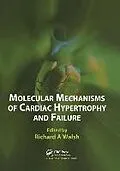This title reviews current knowledge of the mechanisms contributing to heart failure. Editor Richard Walsh and an internationally renowned team of contributors discuss key advances in molecular and cell biology, biochemistry, and pharmacology, focusing on advances that have a direct bearing on current clinical studies. It highlights developments across a broad range of disciplines, with in-depth coverage of each topic providing background and perspective on current literature. By setting new advances in a broader context, this text allows readers to compare different ideas and evaluate their importance in their own areas of research or clinical practice.
Autorentext
Richard A Walsh
Inhalt
Contributors, Preface, Acknowledgements, Abbreviations, Color plate section, Section I: Mechanisms for cardiac hypertrophy, 1 Mechanisms of normal cardiovascular growth and development, 2 Cardiomyocyte cell cycle control, 3 Molecular mechanisms of cardiac myocyte death, 4 Transcription factors and hypertrophy, 5 G protein-coupled receptor activation, 6 Mechanotransduction in cardiomyocyte hypertrophy, 7 Extracellular matrix, 8 Physiological versus pathological cardiac hypertrophy, 9 Alterations in signal transduction, 10 Cell-based therapies for cardiac regeneration and repair, 11 Oxidative stress in the regulation of myocardial hypertrophy and failure, Section II: Mechanisms for contractile depression, 12 Normal and abnormal excitation-contraction coupling, 13 Normal and abnormal calcium homeostasis, 14 Mechanisms of reversible ischemic dysfunction, 15 Cardiac remodeling, 16 The role of inflammatory mediators in cardiac hypertrophy, cardiac remodeling and myocardial dysfunction, 17 Control of cardiac function in health and disease by mechanisms at the level of the sarcomere, 18 Cardiac protein folding and degradation, 19 The cytoskeleton, 20 Adrenergic receptor coupling and uncoupling in heart failure, 21 Environmental factors in cardiac hypertrophy and failure, Section III: Arrhythmogenesis, 22 Cellular and molecular basis of electrogenesis of normal cardiac tissue, 23 Abnormalities of inward currents underlying cardiac depolarization: role in acquired and heritable arrhythmias, 24 Repolarization abnormalities, 25 Cell-cell communication abnormalities, 26 Novel targets for arrhythmia prevention or treatment, 27 Genetic factors underlying susceptibility to common arrhythmias, Section IV: Genetic basis for cardiomyopathy, 28 Epidemiology of left ventricular hypertrophy and dilated cardiomyopathy, 29 Left ventricular hypertrophy in special populations, 30 Monogenic causes of cardiac hypertrophy: hypertrophic cardiomyopathy and related phenotypes, 31 Monogenic dilated cardiomyopathy, 32 Cardiomyopathy in muscular dystrophies, 33 Complex cardiomyopathies: laminopathies and arrhythmogenic right ventricular dysplasia/cardiomyopathy, 34 Mitochondrial cardiomyopathies, 35 Adrenergic receptor polymorphisms in heart failure: molecular and physiological phenotypes, 36 Transcriptional profiling in heart failure, 37 Animal models of hypertrophic cardiomyopathy: relevance to human disease, 38 Clinical proteomics: technologies to define and diagnose heart disease, 39 Animal models of dilated cardiomyopathy and relevance to human disease, 40 Clinical implications for molecular genetics of cardiomyopathy, 41 Future directions for heart failure research, Index
